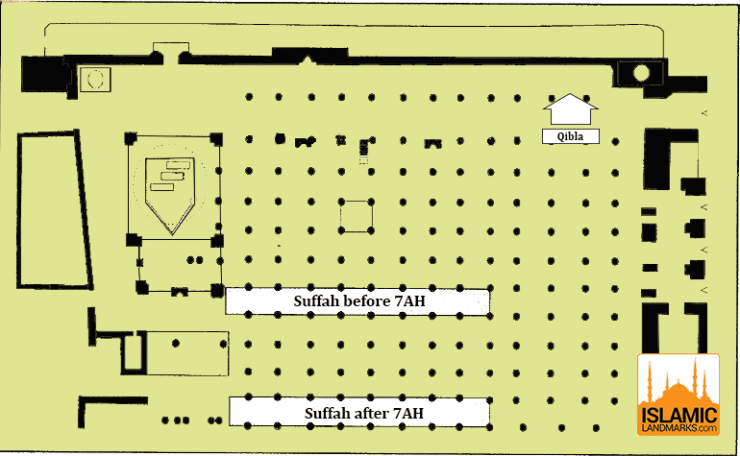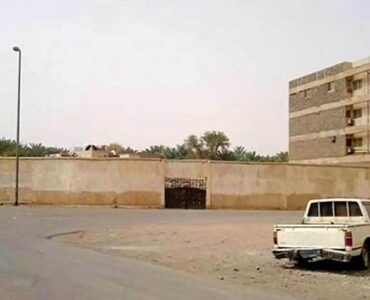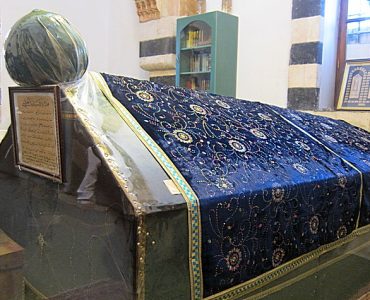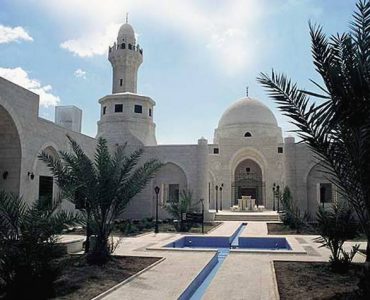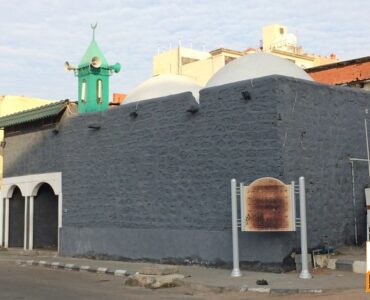This diagram marks the location, towards the front of the present Masjid-e-Nabwi, of the platform that housed the Ashab us-Suffah (The People of the Bench). The platform was originally on the north wall of the masjid and was moved back when the masjid was extended in 7 AH.
- The Ashab us-Suffah were companions of the Prophet (ﷺ) who, along with the performance of religious duties, were mostly tradesmen or farmers. Some had, however, dedicated their lives exclusively for prayer and spiritual discipline in the close company of the Prophet (ﷺ).
- They neither had wives nor children, and if any were to get married, he would leave the group. Many of them would go to the jungle in the day to collect wood, which would then be sold for money to feed themselves and the other members of the ‘suffah’.
- There currently exists a raised platform behind the platform where the Prophet (ﷺ) performed Tahajjud, it is on the right of those entering from Bab-e-Jibraeel. This platform is commonly mistaken to be the platform of the Ashab us-Suffah, it was actually built by the Turks for the service and custodial personnel of the masjid. This section sits outside the masjid in the time of the Prophet (ﷺ) so could not have been the suffah.
- The precise number of the Ashab us-Suffah is not known, but it is estimated that the suffah could hold up to three hundred people at any one time, and that roughly seventy people made up its’ permanent residents. The initial inhabitants of the suffah were members who had migrated from Makkah and were without any accommodation.
Some of the companions who at one time were members of the Ashab us-Suffah were:
- Abu Huraira (رضي الله عنه)
- Abu Dhar al-Ghifari (رضي الله عنه)
- Ka’ab ibn Malik (رضي الله عنه)
- Salman al-Farsi (رضي الله عنه)
- Hanzalah bin Abi Amr (رضي الله عنه)
- Huzaifah bin Yaman (رضي الله عنه)
- Abdullah bin Mas’ood (رضي الله عنه)
- Suhaib bin Sanan Roomi (رضي الله عنه)
- Bilal bin Ribah (رضي الله عنه)
- The Ashab us-Suffah passed their lives in the service of the Prophet (ﷺ). In the morning they would listen to his words of wisdom and at night, after sleeping for a while, they would spend the rest of the time in prayer. Because of their devotion and prayer, many of the Ashab us-Suffah were very poor and unable to afford clothing. Abu Huraira (رضي الله عنه) said, “I saw seventy of Ashab-us-Suffah in such a condition that none of them had complete dress for himself. Each one of them had one sheet that he tied up with his neck. Some of them had their sheets reach near their ankles but others’ sheets reached just below their knees. Each of them used to hold the partition of his sheet with his hand lest his body is exposed”.
- Most of the companions went for two days in succession without food, so much that when the Prophet (ﷺ) came into the masjid to lead the congregational prayers, they would fall down due to weakness. Food given in charity to the Prophet (ﷺ) was given to them, and when the Prophet (ﷺ) was offered food as a present, he would invite them to share it.
- Often, the Prophet (ﷺ) would ask one of his other companions to take some of the Ashab us-Suffah for supper, and to entertain them as best they could. Sa’d ibn ‘Ubada (رضي الله عنه) sometimes entertained as many as eighty men at once.
- Uqbah ibn-e- Amir (رضي الله عنه) has said: “Rasulullah (ﷺ) came to us while we were sitting on the ‘Suffah’ and asked if any one of us would like to go to the market of ‘Buthan’ or ‘Aqiq’ and fetch from there two she-camels of the finest breed without committing any sin or severing a tie of kinship. We replied that everyone of us would love to do so. Rasulullah (ﷺ) then said that going to the masjid (mosque) and reciting or teaching two ayaat are more precious than two she-camels, three ayaat are more precious than three she-camels, and that similarly reciting or teaching of four ‘ayat’ is better than four she-camels and an equal number of camels.” [Muslim]
References: Siratun Nabi – Allama Shibli Nomani, History of Madinah Munawwarah – Dr. Muhammad Ilyas Abdul Ghani, Fazail-e-Aamal – Sheikh Muhammad Zakariyya Kandhalvi

